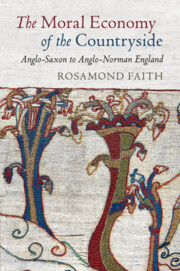Book contents
- Reviews
- The Moral Economy of the Countryside
- The Moral Economy of the Countryside
- Copyright page
- Contents
- Preface
- Abbreviations
- 1 Introduction: The Moral Economy
- Part I Rank
- Part II Reciprocity
- Part III Reputation and Witness
- Part IV The Wolf Sniffs the Wind
- Part V The Aftermath of Conquest
- Part VI In the World of the Manor
- Appendix The Family Farm in Peasant Studies
- Bibliography
- Index
1 - Introduction: The Moral Economy
Published online by Cambridge University Press: 25 October 2019
- Reviews
- The Moral Economy of the Countryside
- The Moral Economy of the Countryside
- Copyright page
- Contents
- Preface
- Abbreviations
- 1 Introduction: The Moral Economy
- Part I Rank
- Part II Reciprocity
- Part III Reputation and Witness
- Part IV The Wolf Sniffs the Wind
- Part V The Aftermath of Conquest
- Part VI In the World of the Manor
- Appendix The Family Farm in Peasant Studies
- Bibliography
- Index
Summary
Chapter 1 sets out the project of the book: to understand how medieval lords came to be able to appropriate the labour of peasants, something that was not fully achieved until after the Norman Conquest. This chronology can partly be explained by the fact that the rural economy of Anglo-Saxon England, which produced little surplus, imposed restraints on the extent to which lords were able to exploit peasants. While those working on the ‘inlands’, the most highly exploited sectors of lordships, were virtual serfs, the peasantry of the ‘warland’ which owed public burdens, were free members of the polity. The book suggests that changes in this situation can be sought in the ‘moral economy’. This term, used by Edward Thompson and James Scott , stands for the structure of values which all members of a society believed should govern their dealings with one another. Rank, reciprocity and reputation are selected as particularly important values and the chapter outlines how they will be followed up. The concepts of ‘peasants’, ‘feudal’ and ‘feudal revolution’ are discussed with reference to the work of Susan Reynolds and Chris Wickham and the chapter ends with remarks on the cultural context of some of our most trusted works of reference: dictionaries.
- Type
- Chapter
- Information
- The Moral Economy of the CountrysideAnglo-Saxon to Anglo-Norman England, pp. 1 - 16Publisher: Cambridge University PressPrint publication year: 2019

